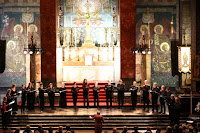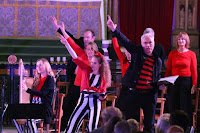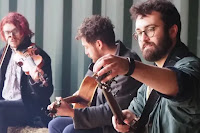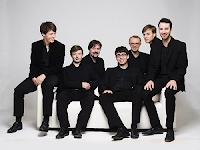
The Madrigal Reimagined is a fascinating programme of vocal, solo instrumental and ensemble pieces from the late sixteenth century, ending with a demonstration of how the madrigal form and style fed into early opera, in a brief selection of highlights from Monteverdi’s L’Orfeo. Ely delivers the Prologue and two key arias (Ahi caso acerbo and Ma io ch’in questa lingua) with clarity and drama, capturing the intensity of the emotion in this chamber rendition. The string Sinfonias are suitably plaintive, emphasised in the rich yet mournful lower registers, yet Vanne Orfeo, with its bright, falling soprano lines, and the cheerful, spirited dance bring the disc to a nonetheless cheerful conclusion.
But before that, we have the delights of Rore, Caccini, Cavaliere and Malvezzi, amongst others. Cipriano de Rore’s (c.1515-1565) Anchor che col partire is heard first in a lute transcription, with Toby Carr bringing out its doleful delicacy, and managing to make the melodic lines sing. Then Carr is joined by Ely, who brings an aching beauty to the vocal line, with effortless diminutions (ornamentation consisting of breaking the melodic line into groups of shorter, often rapid notes), written by Giovanni Battista Bovicelli (1545-1618). Vergine bella and Ben qui si mostra il ciel by Rore have the solo line given over to the violin, with Webber providing the diminutions (along with diminutions by Orazio Bassani (bef.1570-1619) for the former). Webber’s bird-like violin, athletic yet effortless, skitters and meanders over the delicately plucked lute. The final piece by Rore included here, Hor che’l ciel et la terra, also has diminutions by Webber, but this time Ely has the solo line, brightly delivered over rich string textures, with ornamentation in all parts.
There is a sequence of pieces from the famous 1589 Florentine Intermedii, lavish wedding celebrations for Ferdinando de’ Medici and Christine of Lorraine, with their famed extreme special effects. Cristofano Malvezzi’s (1547-1549) Sinfonia a 6, takes us into La Regione dei Demoni (the realm of demons) with its rich, complex string textures, before Giulio Caccini (c.1650-1618) takes us up into the heavens with Io che dal ciel, Ely delivering startlingly shimmering ornamentation here. This segment ends with O che nuovo miracolo by Emilio de’ Cavaliere (c.1550-1602), which dances along with instrumental fizz, the rapid ornamentation adding to the sense of celebration.
There’s more from Monteverdi, with extracts from his Il ballo dell'ingrate, the stately Entrata and swinging Ballo followed by Ah dolente partita, with Ely’s highly expressive falling soprano lines echoed in the violin, here played by Theresa Caudle. Ely’s bell-like high notes cry out, then there’s a swap into her lower vocal register, with Caudle taking over above. Ahi, troppo è duro follows, with dramatic expression and doleful falling lines.
There’s a solemn Canzon by Giovanni Gabrieli (c.1554/1557-1612) from the strings which dances along nicely, the disc opens with Canzon decimottava by Claudio Merulo (1533-1604), brightly paced with clear textures, and Carr also gives us a beautifully sad Preludium from Lorenzo Tracetti (1555-1590). Cruda Amarilli appears first in a setting by Johann Nauwach (1595-1630), Ely’s pure, expressive line gently accompanied by Carr on the theorbo. Ely’s ornamentation here is especially nimble, with humming repititions and fluid runs, and it is then followed by Monteverdi’s more familiar setting, here given over to the plaintive strings. And Giovanni Perluigi da Palestrina (1525-1594) is represented here in Vestiva i colli, with ornamentation shared between the soprano and bass violin in an unusual and delightful dialogue.
With expertly informative notes from Webber, this disc combines these musicians’ clearly expert research and knowledge of this repertoire with virtuosic command of the technical demands of such ornamented performance, making for a highly stimulating and impressive collection.
Various. 2024. The Madrigal Reimagined. Hannah Ely, Toby Carr, Monteverdi String Band, Oliver Webber. Compact Disc. Resonus Classics RES10341.



































